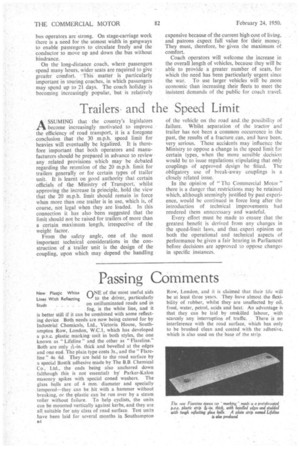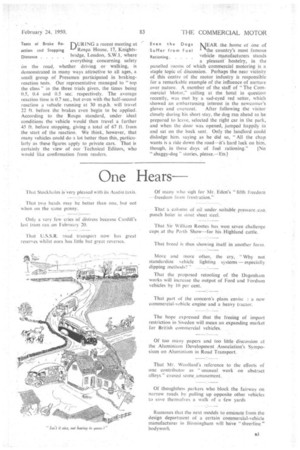Passing Comments
Page 38

Page 39

If you've noticed an error in this article please click here to report it so we can fix it.
New Plastic White nNE of the most useful aids Lines With Reflecting %-.1 to the driver, particularly Studs on unilluminated roads and in fog, is the white line, and it is better still if it can be combined with some reflecting device Both needs are now being catered for by Industrial Chemicals, Ltd., Victoria House, Southampton Row, London, W.C.1, which has developed a p.v.c. plastic marking unit in both styles, the one known as "Lifeline" and the other as " Flareline." Both are only ?e-in. thick and bevelled at the edges and one end. The plain type costs 3s., and the" Flareline" 4s 6d, They are held to the road surface by ,a special Bostik adhesive made by The B.B Chemical Co., Ltd., the ends being also anchored down (although this is not essential) by Parker-Kalon masonry spikes with special coned washers. The glass balls are of 4 mm. diameter and specially tempered—they can be hit with a hammer without breaking, or the plastic can be run over by a steam roller without failure. To help cyclists, the units can be mounted vertically against kerbs, and they are all suitable for any class of road surface. Test units have been laid for several months in Southampton T44
Row, London, and it is claimed that their life will be at least three years. They have almost the flexibility of rubber, whilst they are unaffected by oil, frost, water, petrol, acids and heat. An advantage is that, they can be laid by unskilled labour, with scarcely any interruption of traffic. There is no interference with the road surface, which has only to be brushed clean and coated with the adhesive. which is also used on the base of the strip.
Tests 01 Brake RenuRING a recent meeting at action arid Stopping J-1.Rospa House, 17, Knights
Distance bridge, London, S.W.1, where everything concerning safety on the road, whether driving or walking, is demonstrated in many ways attractive to all ages, a small group of Pressmen participated in brakingreaction tests. Our representative managed to "top the class " in the three trials given, the times being 0.5, 0.4 and 0.5 sec: respectively. The average reaction time is 0.7 sec., but even with the half-second reaction a vehicle running at 30 m.p.h. will travel 22 ft. before the brakes even begin to be applied. According to the Rospa standard, under ideal conditions the vehicle would then travel a further 45 ft. before stopping, giving a, total of 67 ft. from the start of the reaction. We think, however, that many vehicles could do a lot better than this, particularly as these figures apply to private cars. That is certainly the view of our Technical Editors, who would like confirmation from readers.
Even the Dogs Suffer from Fuel
1 'the country's most famous MEAR . the home of one of vehicle manufacturers stands Rationing a pleasant' hostelry, in the panelled rooms of which commercial motoring is a staple topic of discussion. Perhaps the near vicinity of this centre of the motor industry is responsible for a remarkable example of the influence of nurture over nature. A member of the staff of "The Commercial Motor," calling at the hotel in question recently, was met by a sad-eyed red setter, which showed an embarrassing interest in the newcomer's
gloves and overcoat. After following -the visitor closely during his short stay, the dog ran ahead as he prepared to leave, selected the right car in the park, and when the door was opened, jumped happily in and sat on the back seat, Only the landlord could dislodge him. saying as he did so, "All the chap wants is a ride down the road—it's hard luck on him, though, in these days of fuel rationing." [No " shaggy-dog " stories, please.—En.)




































































































